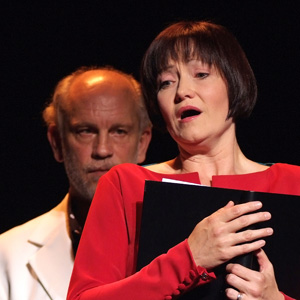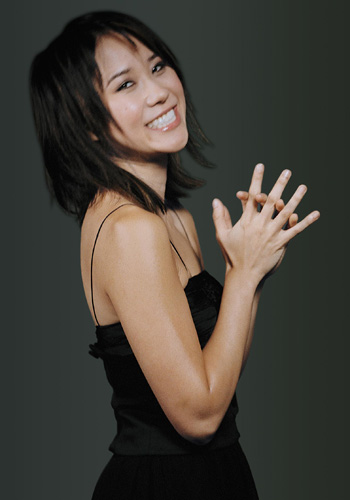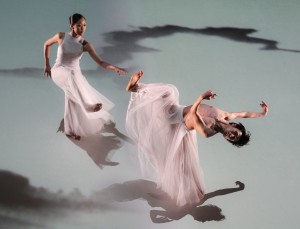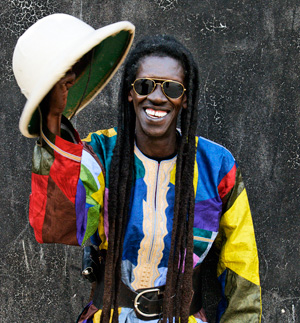Student Spotlight: U-M First-year Student Isabel Park Sets Out to Explore Piano
Editor’s Note: Isabel Park is a first-year student at the University of Michigan, where she’s studying piano at the School of Music, Theatre, and Dance. This year, she’ll explore piano throughout our 2015 season, attending performances by pianist Yuja Wang and violinist Leonidas Kavakos (11/23), Rotterdam Philharmonic Orchestra with pianist Hélène Grimaud (2/19), Academy of St. Martin in the Fields with pianist Jeremy Denk (3/25), and pianist Richard Goode (4/26).
In the essay below, she explores her relationship with the piano. Follow her adventures and thoughts on UMS Lobby.
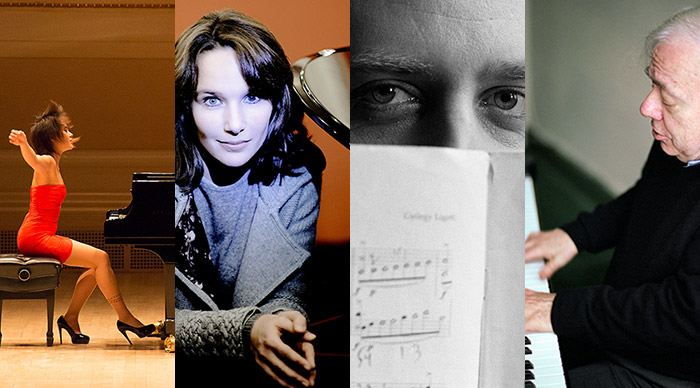
From left to right, pianists Yuja Wang, Hélène Grimaud, Jeremy Denk, and Richard Goode, all part of the 2014-2015 UMS season. Photos by Ian Douglas, Mat Hennek, and Michael Wilson.
The complexity of piano playing is astounding. Rarely do other tasks demand the intensity of full-body engagement that the piano does. Given its intricacy, piano playing can be crudely divided into technical and mental aspects; not surprisingly, a successful piano performance ultimately relies on the pianist’s adeptness in both areas, and the relative importance of each with respect to the other remains a highly disputed topic amongst pianists.
Is technique vital?
However, the relationship between a pianist’s musicianship and technical capacity is not so mutually complementary as it is often thought to be, but rather one-sidedly supplementary. Improving an aspect of one’s playing does not necessarily do the same for the other. Instead, technique supplements ability to express with a boundless sense of musicianship and musicality. Solid technique is not only a desirable, but vital to superlative piano playing that encompasses both outstanding technicality and depth of expression.
It is natural to conclude that the technical facet of piano performance is easier to approach— not necessarily easy— in the sense that improving one’s technique can be done methodically. While musicianship primarily concerns the mind, a highly equivocal part to deal with, technique mainly deals with the pianist’s physical body. The pianist can pinpoint and address specific parts of the body to enhance corresponding areas of technical facility. Not only that, technical development is easier to facilitate than musical growth because it can be measured by a universal numeric system in the form of tempi and durations, which enable objective comparisons and indications of improvement.
A unique body engagement
Yes, piano playing demands an exceptional degree of body engagement. Not only are we exercising hand-eye coordination of infinitesimal detail and precision, but the feet are also working their own set of motion. Even more uniquely, playing piano requires an unusual amount of bodily symmetry. A string player holds and draws the bow with her right hand while the left hand takes charge of fingering; similarly, a brass player manages valves with the left hand while the right hand provides support. On the piano, the hands of a pianist cover the very same keys, able even to crossover, to exchange control over different ranges, which truly gives a pianist’s hands symmetric action and equal opportunity. The bodily symmetry of piano playing also applies to the feet as they share access to the three pedals— one foot per outer pedal and a third equally distanced between the other two.
This quality of piano playing has a rather burdening implication: a pianist’s left and right hands and feet must be perfectly equivalent in terms of technical dexterity. The solution seems unrealistically simple— train each half of the body identically. Unfortunately, this proves problematic because most of us are born with dominant hands and legs that naturally possess a higher level of technical proficiency. The pianist is left with a challenge, alongside many others, of developing an artificial ambidexterity in order to master the symmetric art of piano playing.
Interestingly, piano playing is also set apart from the playing of other instruments by a factor of non-symmetry. This happens in two different, but related, respects— clefs and voices. Aside from other keyboard-natured instruments ( organ, harpsichord), the piano is the only instrument that requires the player to simultaneously read and internalize two different clefs.
A polyphonic ability
But above all, the pinnacle of piano playing and its grandeur is derived from the pianist’s polyphonic ability. Once the pianist considers the multitude of voices that he or she produces, the asymmetric factor becomes intensely complex. Although the prime examples of polyphonic music are the Bach fugues that showcase up to five voices at a time, essentially all piano music encompasses varying degrees of polyphony.
The abundance of notes is not an arbitrary flux, but rather multiple voices concurrently played. The pianist’s responsibility is to prioritize: which is the melody and which are accompaniment? He or she must voice accordingly in order to clearly and efficiently deliver the melody. The greater individuality the fingers possess, the easier this is, since the hand playing the melody is often playing an accompanying voice as well.
But the true challenge of playing polyphonic music extends beyond our fingers. The pianist’s brain must be able to process what is comparable to multiple languages to deliver a cohesive, collective body of sound. This also challenges the ears. The problem usually arises at the point of memorization. At this point, the pianist might be so accustomed to knowing the piece as the collective body of sound that she strives to produce; however, complete memory requires a detailed knowledge of each and every line of sound within the piece as well.
Being on stage
Finally, no matter how prepared, many external factors tamper with a performer’s mental condition when on stage. Performance anxiety almost always results in hyper-awareness, oversensitivity to one’s surroundings and one’s own playing, even. In many cases, the performer becomes so aware of miniscule details that perception is distorted. She could hear things within the piece that seem new or even forget the first note.
In any case, the goal is to replicate this hyper awareness in the practice room so that one simply cannot be ove-aware on stage. To combat this, isolate each sense— hearing, sight, and touch— and focus entirely on it. This level of focus is extremely difficult to maintain for prolonged periods, so dividing the movement or piece into compact sections is more productive.
Why see performances?
But given the endless ways to learn through practice and internalizing, nothing can directly replace the inspiration and teaching that transpires during a live performance. That’s why I am particularly excited to see Yuja Wang, Hélène Grimaud, Jeremy Denk, and Richard Goode live this season.
Yuja Wang has visited my hometown, San Francisco, quite a few times, and I’ve missed all of those performances. The endless mentions of her amazing technical facility and her controversial outfits have raised my curiosity as a fellow female pianist. As for Hélène Grimaud, I first heard of her through a pianist friend who raved about her live performances. Not one to praise easily, my friend has inspired me to find out first-hand what’s made her playing so extraordinary. I read Jeremy Denk‘s blog extensively, and love his very deep sense of understanding of music, something I consider quite important to good performance. On the contrary, Richard Goode remains quite a mystery to me; I know that he is part of the piano faculty at Mannes and have heard highly positive reviews of his performances. I cannot wait to see him perform live to discover what it is about him that captures those around him.
Interested in more? Follow Isabel’s thoughts and adventures here on UMS Lobby. She’ll participate in our “People are Talking!” conversations after each performance she attends.
Behind the Scenes with Yuja Wang
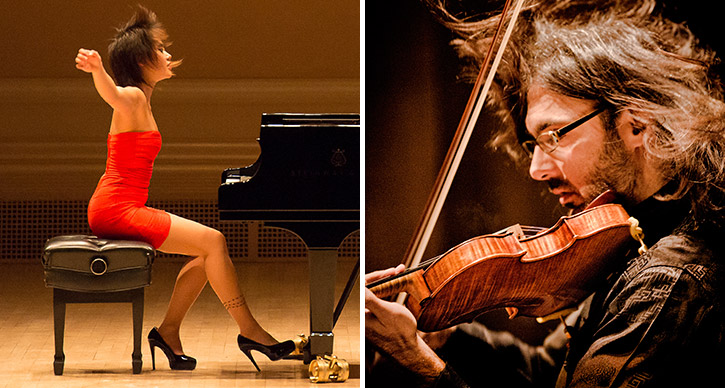
Piano sensation Yuja Wang (left) performs with acclaimed violinist Leonidas Kavakos (right) on November 23, 2014. Photos by Ian Douglas and Marco Borggreve.
We’re very excited for Yuja Wang’s return to Ann Arbor this November, when she’ll perform with the acclaimed Greek violinist Leonidas Kavakos. Yuja last performed in Ann Arbor in a solo recital in 2011, when we had the chance to ask her a few questions.
UMS: You’re often described as a young piano prodigy. How do you think your youth affects your performance?
Yuja Wang: If there is any effect, I think it’s unconscious or subconscious, but the pieces I learned when I was say, before 16, I would never forget, they just stick with you your whole life.
UMS: Can you talk a little about how you put together your programs? What’s your dream program?
YW: Programming is an art and I get inspired by the menus in Japanese restaurants. Variety and unity are key for me now.
UMS: What composer or work do you find most challenging to play? Do you view that as a good thing?
YW: I only play the works in public when I think I can handle it. Playing, perceiving, understanding, internalizing a work sometimes requires a lifetime, it changes when our point of view of life changes, it’s something that stays with your life, something that counts in the end.
UMS: What’s one piece of advice that you could pass on to other young aspiring musicians?
YW: Go with the flow, be creative, transcend to something more cosmic.
Did you attend Yuja Wang’s previous performances in Ann Arbor? Share your thoughts or experiences in the comments below.
Performances for the Whole Family: Filling the master calendar with UMS events
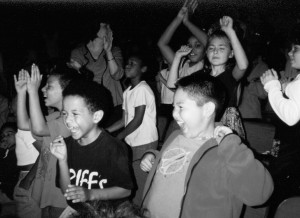 Part of the excitement of coming back to town at the end of summer is collecting all the calendars—Ann Arbor Public School’s holiday and half-day calendar, Huron High School’s band calendar, Clague Middle School’s orchestra calendar, King Elementary School’s PTO calendar, the crew calendar, the soccer calendar, the academic games calendar, University of Michigan’s football calendar, Washtenaw Community College Lifelong Learning calendar, Rec and Ed, Parks and Rec, etc.—whew!—and finally sitting down to map them all out onto one big master calendar in order to see what our year is going to look like.
Part of the excitement of coming back to town at the end of summer is collecting all the calendars—Ann Arbor Public School’s holiday and half-day calendar, Huron High School’s band calendar, Clague Middle School’s orchestra calendar, King Elementary School’s PTO calendar, the crew calendar, the soccer calendar, the academic games calendar, University of Michigan’s football calendar, Washtenaw Community College Lifelong Learning calendar, Rec and Ed, Parks and Rec, etc.—whew!—and finally sitting down to map them all out onto one big master calendar in order to see what our year is going to look like.
My favorite calendar to pore over with the kids is the one from University Musical Society (UMS).
This year, the University of Michigan Center for Chinese Studies is celebrating its 50th anniversary. As usual for an academic department, they have all sorts of lectures and films and special events and conferences planned. University of Michigan Museum of Art is supporting this celebration with a contemporary Chinese woodblock print exhibit. University Musical Society is supporting this celebration with an Asia performance series. I am excited.
When the UMS catalog arrives, the kids keep grabbing it away from one another. They dog-ear the pages that interest them. They recall other concerts and dance performances we have attended.
Little Brother is captivated by the photograph of the old woman and old man sitting in trashcans. What could that possibly be? (Gate Theatre of Dublin) How to explain Beckett’s “Endgame” and “Watt” to a seven year old?
Our pianist, Niu Niu, complains (again) that she likes playing piano but does not like watching piano, but when we begin discuss how the dazzling Yuja Wang recently rocked the Hollywood Bowl with her very short very tight very sexy orange dress, about which reviewer Mark Swed wrote: “Her dress Tuesday was so short and tight, that had there been any less of it, the Bowl might have been forced to restrict admission to any music lover under 18 not accompanied by an adult.” Oh, and her legendary speed, too. Now Niu Niu is convinced. Our first concert marked on the calendar.
Cloud Gate Dance Theatre of Taiwan is my choice. I have already heard many Taiwanese American friends discussing how the choreography is inspired by Chinese calligraphy and classical landscape painting. Local Chinese calligraphers will be demonstrating and displaying their work before the performance to connect these two artforms.
Hao Hao wants to go see AnDa Union from Inner Mongolia. I thought it was because her great-grandfather was born in Inner Mongolia, but really it is because she remembers the Mongolian throat singers we once heard perform at the Ann Arbor District Library.
M is intrigued by the Chamber Ensemble of the Shanghai Chinese Orchestra because she knows more about Chinese music than any of us, but the Ballet Preljocal looks amazing. An antithesis of Disney’s Snow White? It looks dark and grim and sexy and strange—irresistible for teenagers dressed all in black.
Now, big sigh, the tickets.
I was so grateful when UMS began their teen ticket program a few years ago, at last an affordable way to bring my teenagers to UMS programs. I was even more grateful when I was able to go with the children’s school field trips as a chaperone. This year, UMS is launching a new UMS “Kids Club” program for students in grades 3 to 12: “Two weeks before opening night, parents can purchase up to two kids’ tickets for $10 each with the purchase of an adult ticket for $20.”
Great! So now we can take the whole family.
Q&A with piano sensation Yuja Wang
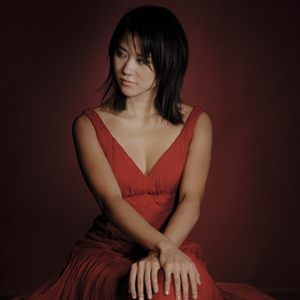 We asked you to send us your questions for pianist Yuja Wang. Her answers are below. Yuja is performing at Hill Auditorium on Sunday, October 9.
We asked you to send us your questions for pianist Yuja Wang. Her answers are below. Yuja is performing at Hill Auditorium on Sunday, October 9.
Q: You’re often described as a young piano prodigy. How do you think your youth affects your performance?
If there is any effect, I think it’s unconscious or subconscious, but the pieces I learned when I was say, before 16, I would never forget, they just stick with you your whole life.
Q: Can you talk a little about how you put together your programs? What’s your dream program?
Programming is an art and I get inspired by the menus in Japanese restaurants. Variety and unity are key for me now.
Q: What composer or work do you find most challenging to play? Do you view that as a good thing?
I only play the works in public when I think I can handle it. Playing, perceiving, understanding, internalizing a work sometimes requires a lifetime, it changes when our point of view of life changes, it’s something that stays with your life, something that counts in the end.
Q: What’s one piece of advice that you could pass on to other young aspiring musicians?
Go with the flow, be creative, transcend to something more cosmic.
VIDEO: Center for Chinese Studies New Millennium Kite Festival
Our Asia Series starts with Yuja Wang on October 9th.
This weekend, Center for Chinese Studies, inspired by the traditional Asian craft of kite flying, presented a one-day jubilee with a community competition, master kite fly-offs, lion dancing, and wind-borne activities, including a DIY kite workshop on September 25. Check out the fun:
http://www.youtube.com/watch?v=Opxj6G5kTo8
Ask Yuja Wang
Yuja Wang is a 24-year old piano sensation. With a program that features works by Rachmaninoff, Scriabin, Debussy, Albéniz, and Ravel, she returns to Ann Arbor after her wildly successful UMS debut in 2008, just months after graduating from The Curtis Institute of Music in Philadelphia. Since her last UMS appearance, Wang has spent her time criss-crossing the globe with a cavalcade of impressive debuts and awards, including the prestigious Avery Fisher Career Grant, given to select musicians destined for bright solo careers.
Surely you have a question for her. Send us your questions for Yuja! Tweet your questions @UMSNews, post them on our Facebook page, or in the comment below. We’ll pass the best questions on to Yuja. Stay tuned.
11/12 Choral Union Series
Within the signature Choral Union Series, UMS presents 10 concerts in historic Hill Auditorium:
Subscription packages go on sale to the general public on Monday, May 9, and will be available through Friday, September 17. Current subscribers will receive renewal packets in early May and may renew their series upon receipt of the packet. Tickets to individual events will go on sale to the general public on Monday, August 22 (via www.ums.org) and Wednesday, August 24 (in person and by phone). Not sure if you’re on our mailing list? Click here to update your mailing address to be sure you’ll receive a brochure.
John Malkovich in The Infernal Comedy: Confessions of a Serial Killer
with The Vienna Academy Orchestra
and sopranos Valerie Vinzant and Louise Fribo
Martin Haselböck, conductor
Saturday, October 1, 8pm
John Malkovich makes his UMS debut as a dead serial killer who returns to the stage to present his autobiography in a public reading. Malkovich appears as part of a theatrical opera of sorts that features a 40-piece chamber orchestra and two sopranos telling the real-life story of Jack Unterweger, a convicted murderer and acclaimed prison poet who had been pardoned by the Austrian president Kurt Waldheim in 1990 at the behest of Viennese literati. This gripping performance uses arias and music by Gluck, Vivaldi, Mozart, Beethoven, Boccherini, and Haydn as the counterpoint to Malkovich’s emotional monologue, which shifts between reality and delusion.
Yuja Wang, piano
Sunday, October 9, 4pm
Twenty-four-year-old Chinese pianist Yuja Wang is widely recognized for playing that combines the spontaneity and fearless imagination of youth with the discipline and precision of a mature artist. She made her UMS debut in January 2008, just months after graduating from the Curtis Institute of Music, and since then has spent each year criss-crossing the globe with a cavalcade of impressive debuts and awards, including the prestigious Avery Fisher Career Grant, given to select musicians destined for bright solo careers.
Program
Ravel | Miroirs
Copland | Piano Variations
Rachmaninoff | Selected Preludes
Brahms | Sonata No. 1 or No. 3
Apollo’s Fire with Philippe Jaroussky, countertenor
Jeannette Sorrell, music director
Thursday, November 3, 8pm
UMS is delighted to welcome French countertenor Philippe Jaroussky in his UMS debut for this performance with Apollo’s Fire, “one of the nation’s leading baroque orchestras.” (Boston Globe) Named for the classical god of music and the sun, Apollo’s Fire was founded in 1992 by the young harpsichordist and conductor Jeannette Sorrell, who envisioned an ensemble dedicated to the baroque ideal that music should evoke various passions in its listeners. Together they explore the full dramatic range of Handel and Vivaldi’s arias for the virtuoso castrato singers of the 18th century.
Program
Handel | “Disperato il mar turbato” from Oreste
Handel | “Con l’ali di costanza” from Ariodante
Vivaldi | Concerto for Four Violins in b minor
Vivaldi | “Se in ogni guardo” from Orlando Finto Pazzo
Vivaldi | “Se mai senti spirati sul volto” from Catone in Utica
Vivaldi/Sorrell | La Folia (“Madness”)
Vivaldi | “Vedro con mio diletto” from Giustino
Vivaldi | “Nel profondo” from Orlando Furioso
London Philharmonic Orchestra
Vladimir Jurowski, conductor
Janine Jansen, violin
Tuesday, December 6, 8pm
The London Philharmonic returns for its first appearance since November 2006, this time under the direction of the exciting young conductor Vladimir Jurowski, who became the orchestra’s principal conductor in 2007, succeeding Kurt Masur. Janine Jansen, a 23-year-old violinist who has been a huge star in her native Holland ever since her Concertgebouw debut at the age of 10, makes her UMS debut as violin soloist.
Program
Pintscher | Towards Osiris (2005)
Mozart | Violin Concerto No. 5 in A Major, K. 219 (1775)
Tchaikovsky | Manfred Symphony, Op. 58 (1885)
From the Canyon to the Stars
Hamburg State Symphony
Jeffrey Tate, conductor
Francesco Tristano, piano
Daniel Landau, filmmaker
Sunday, January 29, 4pm
In 1971, Alice Tully, a New York performer and philanthropist who contributed toward the construction of the chamber music hall in Lincoln Center that bears her name, commissioned the French composer Olivier Messiaen to write a piece commemorating America’s Bicentennial. Messiaen was inspired and fascinated by the natural wonder he found in the landscapes of the American West. Des canyons aux étoiles represents Messiaen’s sonic impressions of America’s last untouched frontier.
Program
Messiaen | Des canyons aux étoiles
Chicago Symphony Orchestra
Riccardo Muti, conductor
Pinchas Zukerman, violin
Friday, March 9, 8pm
Riccardo Muti, the Chicago Symphony’s new music director, makes his first UMS appearance in 6 years, conducting an all-Brahms program. Violinist Pinchas Zukerman, recognized as a phenomenon for nearly four decades, returns to UMS for a performance of the Brahms Violin Concerto.
Program
Brahms | Violin Concerto in D Major, Op. 77
Brahms | Symphony No. 2 in D Major, Op. 73
Denis Matsuev, piano
Thursday, March 15, 8pm
Anyone who attended last season’s concert by the Mariinsky Orchestra came away talking about one thing: the astonishing piano soloist Denis Matsuev, whose extraordinary performance of Rachmaninoff’s Third Piano Concerto had the audience buzzing in the lobby at intermission, immediately after the performance, and for weeks beyond the concert hall.
Program
Tchaikovsky | Seasons, Op. 37a
Rachmaninoff | Prelude in g minor, Op. 23, No. 5
Rachmaninoff | Prelude in g-sharp minor, Op. 32, No. 12
Rachmaninoff | Étude-Tableaux, Op. 39, No. 6
Scriabin | Etude in c-sharp minor, Op. 2, No. 1
Scriabin | Etude in d-sharp minor, Op. 8, No. 12
Tchaikovsky | Dumka (Russian Rustic Scene), Op. 59
Stravinsky | Three Movements from Petrouchka
American Mavericks
San Francisco Symphony
Michael Tilson Thomas, conductor
Featuring: Emanuel Ax, piano
St. Lawrence String Quartet
Jessye Norman, soprano, Meredith Monk, vocals, and Joan La Barbara, vocals
Jeremy Denk, piano
Paul Jacobs, organ
Thursday, March 22 – Saturday, March 24
As part of its centennial season, Michael Tilson Thomas and the San Francisco Symphony will present its second American Mavericks Festival in March 2012, which will tour to only two venues in the US: Hill Auditorium and Carnegie Hall. The 2012 festival celebrates the creative pioneering spirit and the composers who created a new American musical voice for the 20th century and beyond. Choral Union Subscribers may choose two of the three concerts on the series.
Program 1 (Thurs 3/22, 7:30p)
Paul Jacobs, organ
Jeremy Denk, piano
Aaron Copland | Orchestral Variations (1930, orchestrated in 1957)
Henry Cowell | Piano Concerto (1928)
Mason Bates | Mass Transmission (2010)
Lou Harrison | Concerto for Organ with Percussion Orchestra
Program 2 (Fri 3/23, 8pm)
Jessye Norman, soprano
Meredith Monk, vocalist
Joan La Barbara, vocalist
St. Lawrence String Quartet
Henry Cowell | Synchrony
John Adams | Absolute Jest (2011)
John Cage | John Cage Songbooks (1970)
Edgard Varese | Amériques
Program 3 (Sat 3/24, 8pm)
Emanuel Ax, piano
Carl Ruggles | Sun-Treader
Morton Feldman | Piano and Orchestra (1975)
Ives | A Concord Symphony
Academy of St. Martin-in-the-Fields
Joshua Bell, director and violinist
Sunday, April 22, 4pm
Formed from a group of leading London musicians and working without a conductor, the Academy gave its first performance in its namesake church in November 1959. For their first UMS appearance in 11 years, the Academy brings their highly lauded sound to an exquisite all-Beethoven program. Superstar violinist Joshua Bell attacks the stunning Beethoven Concerto with his breathtaking virtuosity and sumptuous tone and leads the rest of the program from the concertmaster’s chair.
Program
Beethoven | Coriolan Overture, Op. 62
Beethoven | Concerto for Violin in D Major, Op. 62
Beethoven | Symphony No. 7 in A Major, Op. 92
Return to the complete chronological list.
11/12 Asia & World Series
Asia
UMS focuses its global programming on four different regions of the world — the Arab World, Africa, the Americas, and Asia — with one region enjoying a particular focus during each season. Following the celebration of the performing arts of the Americas in the 10/11 season, UMS turns its thematic focus to Asia, specifically highlighting artists from China, Taiwan, Inner Mongolia, and India.
Subscription packages go on sale to the general public on Monday, May 9, and will be available through Friday, September 17. Current subscribers will receive renewal packets in early May and may renew their series upon receipt of the packet. Tickets to individual events will go on sale to the general public on Monday, August 22 (via www.ums.org) and Wednesday, August 24 (in person and by phone). Not sure if you’re on our mailing list? Click here to update your mailing address to be sure you’ll receive a brochure.
Yuja Wang, piano
Sunday, October 9, 4pm
Hill Auditorium
Twenty-four-year-old Chinese pianist Yuja Wang is widely recognized for playing that combines the spontaneity and fearless imagination of youth with the discipline and precision of a mature artist. She made her UMS debut in January 2008, just months after graduating from the Curtis Institute of Music, and since then has spent each year criss-crossing the globe with a cavalcade of impressive debuts and awards, including the prestigious Avery Fisher Career Grant, given to select musicians destined for bright solo careers.
Program
Ravel | Miroirs
Copland | Piano Variations
Rachmaninoff | Selected Preludes
Brahms | Sonata No. 1 or No. 3
Water Stains on the Wall
Cloud Gate Dance Theatre
Lin Hwai-min, artistic director
Friday, October 21, 8pm
Saturday, October 22, 8pm
Power Center
Trained in tai chi, meditation, Chinese opera movement, modern dance, and ballet, Cloud Gate Dance Theatre performs a rich repertoire with roots in Asian myths, folklore, and aesthetics, all infused with a contemporary perspective. For this long-awaited UMS debut, Cloud Gate presents Hwai-min’s newest work, Water Stains on the Wall. “Water stains on the wall” is a popular metaphor that represents the highest state in the aesthetics of Chinese calligraphy. Hwai-min and dancers take off from this metaphor and create and abstract work of beauty and magic that stands sublimely on its own.
AnDa Union from Inner Mongolia
Wednesday, November 9, 7:30pm
Michigan Theater
Formed in 2003, AnDa Union’s 14 members all hail from the Xilingol Grassland area of Inner Mongolia, a semi-autonomous region of China. AnDa Union are part of a musical movement that is finding inspiration in old and forgotten folk music from the nomadic herdsman cultures of Inner and Outer Mongolia, drawing on a repertoire of music that has all but disappeared during China’s recent tumultuous past. Its members are accomplished singers and instrumentalists, performing on the traditional horse-head fiddle (tsuur), the maodun chaoer, a three-holed flute, as well as Mongolian versions of the dulcimer, zither, lute, and mouth harp.
Beijing Guitar Duo with Manuel Barrueco
Sunday, November 20, 4 pm
Rackham Auditorium
Meng Su and Yameng Wang are widely noted for their outstanding technique and artistic musicality. They first met at the Central Conservatory in Beijing, where they began studying with the acclaimed professor Chen Zhi as children. Both women have won the Tokyo International Guitar Competition (Yameng Wang won it at age 12), and have received heaps of acclaim and recognition at international guitar events and from other seasoned guitarists, including Sergio Assad who has written and dedicated works to them. In 2008, they went to study with Manuel Barrueco at the Peabody Conservatory of Music in Baltimore and officially established themselves as the Beijing Guitar Duo. Both individually and together, their impressive talents come together to create one of the most excited guitar duos on the scene today.
Chamber Ensemble of the Shanghai Chinese Orchestra
Friday, February 10, 8pm
Rackham Auditorium
The 20 members of the Shanghai Traditional Chamber Ensemble are drawn from the first large-scale modern orchestra of traditional instruments in China. While Chinese stars such as Lang Lang have brought new attention to Western classical music in China, this ensemble provides a window into the traditional Chinese classical music that dates back centuries.
Zakir Hussain and the Master Musicians of India
Fazel Qureshi, tabla and kanjira
Rakesh Chaurasia, bansuri
Dilshad Khan, sarangi
Navin Sharma, dholak
Abbos Kosimov, doyra
Meitei Pung Cholom Performing Troupe (Dancing Drummers of Manipur)
Thursday, April 12, 7:30pm
Hill Auditorium
Zakir Hussain is today appreciated both in the field of percussion and in the music world at large as an international phenomenon. A classical tabla virtuoso of the highest order, his consistently brilliant and exciting performances have not only established him as a national treasure in his own country, but have earned him worldwide fame. For this return appearance, he performs with a host of Indian classical music greats, as well as the dancing drummers of Manipur.
Other World Music
In addition to the events from Asia listed above, UMS presents Goran Bregovic and His Wedding and Funeral Orchestra, which combines a Serbian Gypsy Band, string ensemble, orthodox male choir, and two Bulgarian female vocalists in a wild ride in Hill Auditorium; flamenco star Diego El Cigala; Max Raabe and Palast Orchester, recreating the high style and musical glory of the Weimar era; and Senegalese singer/songwriter Cheikh Lô.
Goran Bregovic & His Wedding and Funeral Orchestra
A Serbian Gypsy Band, Classical String Ensemble,
Orthodox Male Choir, and Two Bulgarian Female Vocalists
Saturday, October 15, 8 pm
Hill Auditorium
“It was party time…a Balkan free-for-all, and the jam-packed auditorium went wild…” (The Jerusalem Post) Balkan music icon and acclaimed film composer Goran Bregovic celebrates the music of Europe’s Gypsy tradition. With a 20-piece ensemble consisting of a Serbian gypsy band, a classical string ensemble, an all-male choir, two Bulgarian female singers and Bregovic’s own electric guitar, the music blends raucous gypsy dance tunes with traditional Eastern European choral music, spinning it all through a rock ‘n roll cycle.
Diego El Cigala
Saturday, November 5, 8 pm
Michigan Theater
Diego is a famous flamenco singer who started off by singing for well-known flamenco dancers but has since “moved to the front,” which in flamenco slang means to sing on one’s own instead of accompanying a dancer. He has collaborated with a variety of musicians, including Bebo Valdés, the Cuban pianist and bandleader with whom he recorded Lágrimas Negras, an album that created a sensation in Spain, becoming one of the best-selling albums in that country’s history and receiving a pile of awards, including five Latin Grammy nominations and the New York Times’ 2003 “Album of the Year” honors.
Berlin Nocturne
Max Raabe & His Palast Orchester
Saturday, March 10, 8pm
Hill Auditorium
“Max Raabe and his 12-piece Palast Orchester are re-creating the music of the Weimar era with verve and class.” (Time Out New York) A nostalgic homage to the legendary nocturnal flair of the Weimar Era, the debonair Max Raabe embodies the high style and music glory of the 1920s and 1930s, all backed by his stellar 12-member band. His art lies in revealing the enigmatic intelligence, ambiguity, musical power and complexity of the “German chansons” from the turbulent Weimar Republic — and then shaking it up with a completely unexpected cover from the contemporary pop realm.
Cheikh Lô
Friday, April 13, 8pm
Michigan Theater
Cheikh Lô is one of the great mavericks of African music. A superb singer and songwriter, as well as a distinctive guitarist, percussionist, and drummer, he has personalized and distilled a variety of influences from West and Central Africa to create a style that is uniquely his own. After emigrating to Paris and then returning to Senegal in the late 1980s, Lô attracted both the attention of and comparisons to Youssou N’Dour, who produced two of his early albums. His signature blend of semi-acoustic flavors — West and Central African, funk, Cuban, flamenco — has been distilled into his most mature, focused, yet diverse statement today, with his husky, sensual voice sounding better than ever.
Return to the complete chronological list.


